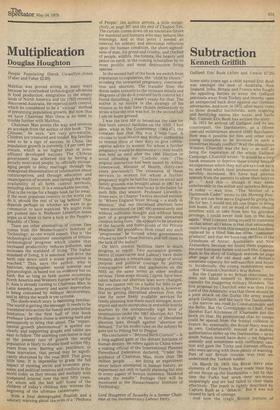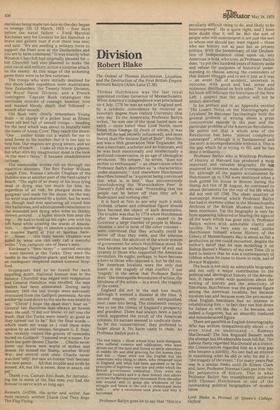Subtraction
Kenneth Griffith
Gallipoli Eric Bush (Allen and Unwin £7.25)
Some sixty years ago a child named Eric Bush was amongst the men of Australia, New Zealand, India, Britain and France who fought
the appalling battles to wrest the Gallipoli peninsula away from Turkey and thereby open an unexpected back door against our German adversaries. And now, in 1975, after many visits to those dreadful battlefields, with inspiring and horrifying names like Anzac and Suvla Bay, Captain Eric Bush has written the story.
In 1915 he arrived off Gallipoli and its sea counterpart, the Dardanelles, as a fifteen year-old midshipman aboard HMS Bacchante.
How was it possible for him and other very young comrades to be involved in such a monstrous bloody conflict? Well the ubiquitous Winston Churchill was the key — as well as being the inspiration of the whole Gallipoli
Campaign. Churchill wrote: -It would be a very
harsh measure to deprive these young boys of an experience which they will always look back to, and from which their professional value is sensibly increased. We have had piteous appeals from the parents to allow their boys to go ... " And this — though it may seem unbelievable in the selfish and spineless Britain of today — was true. "The Mother of a Dartmouth Cadet" wrote to the Morning Post: "If my son can best serve England by giving his life for her, I would not lift one finger to bring him home. If any act or word of mine, should interfere with or take from him his grandest privilege, I could never look him in the face again." Well I cannot bring myself to comment on that letter; all I know is that that astounding vision has gone from this country and has been replaced by a blind lust for more "consumer products" and that we have lost the love of the Grandsons of Anzac: Australians and New Zealanders, because we found them expenda ble over European butter and such like. Captain Bush in his story of Gallipoli reminds us page after page of the old dead tale of Britain's sometime capacity for self-sacrifice and loyalty. Incidentally, the young midshipmen were called "Winston Churchill's War Babies."
But the Captain is no British chauvinist; he does not blind himself to Britain's other capacity for staggering military blunders. The first proposal by Churchill who was then First Lord of the Admiralty was that there should be a joint attack on the Turks: the army would attack Gallipoli, and the navy the Dardanelles — the narrow sea road to Constantinople and the Baltic. But the Commander in Chief, Field Marshal Earl Kitchener of Khartoum put the block on that. He pronounced that no troops could be spared from the frontal collision in France. So, eventually, the Royal Navy was on its own. Unfortunately instead of a dashing authoritative strike up the Dardanelles — as no doubt Nelson would have done — we fidgeted uneasily and sometimes with inefficient caution and gave the Turks and German officers who were serving with them plenty of warning. Part of our British trouble was tnat we underrated the Turkish soldier.
On March 18, 1915, the Royal Navy plus elements of the French Navy made their first all-out thrust up the Dardanelles — but by this time the Turks had sown their sea-mines unsparingly and we had failed to clear them effectively. The result is rightly described by Captain Bush as a "debacle," But it was not caused by lack of courage. And now the tragic British pattern of decisions being made too-late-in-the-day began to emerge. On 12 March, 1915 — four days before the naval failure — Field Marshal Kitchener sent for General Sir Ian Hamilton (a brave and gallant man if ever there was one) and said: "We are sending a military force to support the Fleet now at the Dardanelles and you are to have command." It was exactly what Winston Churchill had originally pleaded for — but Churchill had also planned to make the joint naval and military action a surprise attack on the enemy. At this stage of the sickening game there were to be few surprises.
The troops who were initially destined for this doom laden expedition were Australians, New Zealanders, the Twenty Ninth Division, the Royal Naval Division, and a French contingent. Captain Bush catalogues the inevitable mixture of courage, humour, love and massed bloody death that followed — month after month.
Old Bush very clearly remembers Young Bush — in charge of a picket boat at fifteen years old and full of assault troops — heading for the land which was about to brutally earn the name of Anzac Cove. They reach the shore: "One ... soldier holds out a watch for me to send home to his mother, but it is too late to help him. Our engines are going astern, and we are out of reach ... I take all this in at a glance, but what stirs my imagination most is the look on the men's faces." It became unadulterated carnage.
The memorable stories roll on through the repetitive disasters. The Rev Father William Joseph Finn, Roman Catholic Chaplain of the Dublins was at another part of the field called V Beach. "The sight of so many of his boys lying dead or dying was too much for him, so, regardless of all risk, he plunged down the gangway and made for the shore. On the way his wrist-was shattered by a bullet, but he went on, though lead was spattering all round him like hailstones, and administered consolation to the wounded and dying who were so thickly strewn around ... a bullet struck him near the hip ... He had to hold up his right arm with his left hand while uttering the words of Absolution,' . . deinde ego te absolvo a peccatis tuis in nomine PatriS et Filii et Spiritus Sancti ... Amen' .-.. this truly heroic chaplain was killed by what one can only call a merciful bullet." Yes, certainly one of Jesus's men.
Kitchener's "New Army" — untried recruits — were thrown at the Turks. They were the lambs in the slaughter-place, and led there by an inadequate shepherd named General Stopford.
Scapegoats had to be found for such appalling death. National honour was in the balance. Churchill was edged into resignation and General Hamilton was recalled; the best leaders had been eliminated. During early January 1916 the last troops were nervously evacuated from the Gallipoli peninsula. As one soldier tip-toed down to the sea he was heard to say: "Christ! 1 hope the dead don't hear us.'' General Ian Hamilton was always an honest man. He said: "I did not know, to tell you the truth, that the Turks were nearly as good as they turned out to be." But the final words — which made me weep as I read them were spoken by an old veteran, Sergeant G. E. Dale, who recently visited the graves of comrades buried on Gallipoli: "I paused over a name. For there lies quiet decent Charlie . . . Charlie never knew our brave new world of strikes and demos. He missed the Slump, another World War, and several cold ones. Charlie never watched 'telly' nor saw an honest 'bob' become five new pence ... All that trouble and strife he missed. Ah, but life is sweet. Rest in peace, old pal."
Thank you, Captain Eric Bush, for introducing me to some of the fine men you had the honour to serve with so long ago.
Kenneth Griffith, the actor and writer, has Most recently written Thank God They Kept The Flag Flying.



























 Previous page
Previous page